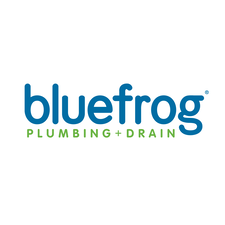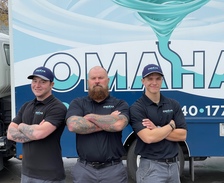
Get matched with top water heater installers and replacers in your area
Enter your zip and get matched with up to 3 pros
Matching on HomeAdvisor


Water heater installers and replacers in Omaha

Bluefrog Plumbing + Drain of West Omaha is a trusted, family-owned plumbing company dedicated to providing reliable, high-quality plumbing services to residential and commercial clients. Our team offers a wide range of services including drain cleaning and jetting, water softener install, gas plumbing, camera pipe inspections, sewer services and more! Our goal is to educate you on the issue at hand and come together to find the best solution for your home or business.
Bluefrog Plumbing + Drain of West Omaha is a trusted, family-owned plumbing company dedicated to providing reliable, high-quality plumbing services to residential and commercial clients. Our team offers a wide range of services including drain cleaning and jetting, water softener install, gas plumbing, camera pipe inspections, sewer services and more! Our goal is to educate you on the issue at hand and come together to find the best solution for your home or business.

We are committed to excellence in every aspect of our business. We uphold a standard of integrity bound by fairness, honesty and personal responsibility. Our distinction is the quality of service we bring to our customers. Accurate knowledge of our trade combined with ability is what makes us true professionals. Above all, we are watchful of our customers interests, and make their concerns the basis of our business.
We are committed to excellence in every aspect of our business. We uphold a standard of integrity bound by fairness, honesty and personal responsibility. Our distinction is the quality of service we bring to our customers. Accurate knowledge of our trade combined with ability is what makes us true professionals. Above all, we are watchful of our customers interests, and make their concerns the basis of our business.
FAQs for water heater installation and replacement projects in Omaha, NE
You'll need an expansion tank if your home has a closed water system, which is standard in newer homes or those with backflow preventers or pressure regulators. Expanding hot water has nowhere to go in closed systems, creating potentially damaging pressure. The expansion tank provides space for this expanded water, protecting your plumbing system and water heater from premature failure. Many local building codes now require expansion tanks, and some water heater warranties may be voided without one.
For a standard 50-gallon water heater, a two-gallon expansion tank is sufficient. This sizing assumes normal household water pressure between 40 and 60 psi. If your home has higher water pressure (60 to 80 psi), consider upgrading to a slightly larger tank for added protection. The expansion tank's purpose is to accommodate the increased volume that occurs when cold water heats up, which is proportional to your water heater's capacity.
Watch for signs like dripping water around the tank, fluctuating water pressure throughout your home, or unusual noises in your plumbing system. A properly functioning expansion tank should feel light when tapped on the bottom—if it feels heavy or waterlogged, the internal bladder has likely failed. Other indicators include frequent triggering of your temperature and pressure relief valve, visible corrosion on the tank, or unexplained increases in your water bill, suggesting hidden leaks.
Most expansion tanks have a service life of five to 10 years, though some may last up to 12 years or more with proper maintenance. Factors affecting lifespan include water quality, system pressure, installation quality, and tank construction. Hard water areas often see shorter lifespans due to mineral buildup. Regular maintenance checks can help identify potential issues before complete failure. When your water heater is due for replacement, it's wise to replace the expansion tank simultaneously, even if it hasn't failed yet.
A 30-gallon water heater needs an expansion tank if your home has a closed plumbing system. The need for an expansion tank is determined by your plumbing system type rather than water heater size. Even smaller water heaters create thermal expansion when heating water. If your home has a backflow preventer, pressure regulator, or check valve on the main water line, you have a closed system that requires an expansion tank. Check your local plumbing codes, as many jurisdictions now mandate expansion tanks regardless of water heater size.





- Plumbing - Multiple Projects
- Shower Pan Install
- Plumbing for a Remodel or Addition - Install
- Plumbing Item Repair
- Water Heater - Repair or Service
- Sink Repair
- Steam Shower - Install
- Faucet Install or Replace
- Walk In Tub - Install or Replace
- Drain Repair
- Shower Install or Replace
- Pipe Repair
- Drain Line Breakage - Camera Locate
- Tankless Water Heater - Install
- Water Main - Install, Replace or Repair
- Sump Pump - Repair or Replace
- Drain Clog or Blockage - Clear
- Sewer Main - Clear
- Faucets, Fixtures and Pipes - Repair or Replace
- Plumbing Item Installation
- Sink Installation
- Pipe Installation
- Faucet Installation
- Gas Piping
- Whirlpool Bathtub Install or Replace
- Plumbing Multi-Item Installation
- Sewer Main - Install, Replace or Repair
- Drain Installation
- Plumbing Multi-item Repair
- Toilet Installation
- Bathtub Install or Replace
- Sump Pump or Interior Foundation Drains - Install
- Birmingham
- Phoenix
- Tucson
- Fresno
- Long Beach
- Los Angeles
- Modesto
- Sacramento
- San Diego
- San Francisco
- San Jose
- Denver
- Hartford
- Washington DC
- Fort Lauderdale
- Jacksonville
- Miami
- Orlando
- Tampa
- Atlanta
- Chicago
- Indianapolis
- Louisville
- New Orleans
- Baltimore
- Boston
- Detroit
- Grand Rapids
- Minneapolis
- Saint Paul
- Kansas City
- Saint Louis
- Las Vegas
- Albany
- New York
- Asheville
- Charlotte
- Greensboro
- Raleigh
- Winston Salem
- Cincinnati
- Cleveland
- Columbus
- Oklahoma City
- Portland
- Harrisburg
- Philadelphia
- Pittsburgh
- Providence
- Memphis
- Nashville
- Austin
- Dallas
- El Paso
- Fort Worth
- Houston
- San Antonio
- Salt Lake City
- Norfolk
- Richmond
- Virginia Beach
- Seattle
- Madison
- Milwaukee




